
A Holocaust survivor newly arrived in 1940s New York. An African-American couple who’ve journeyed north in the tumultuous ’60s in hopes of escaping racism down south. The Japanese-American grandson of WWII internment camp detainees circa 1988. A Syrian refugee in Trump-era America. Playwright Jennifer Maisel weaves together these characters and their interconnected stories in her decades-spanning World Premiere drama Eight Nights, an Antaeus Theatre Company triumph.
 We first meet Rebecca Blum (Zoe Yale), on December 15, 1949 in the Lower East Side apartment where her father Erich (Arye Gross) has spent the ten years since his escape from Nazi Germany dreaming of her arrival on safer American shores.
We first meet Rebecca Blum (Zoe Yale), on December 15, 1949 in the Lower East Side apartment where her father Erich (Arye Gross) has spent the ten years since his escape from Nazi Germany dreaming of her arrival on safer American shores.
If only Erich’s wife and his three young daughters has accompanied him earlier in 1939 instead of staying behind an extra few months, they would not have found themselves aboard the MS St. Louis on the infamous “Voyage Of The Damned,” rerouted back to Europe when no North American country would allow its 937 mostly Jewish passengers asylum.
Only Rebecca survived the death camps.
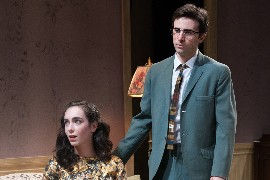 As we follow her life over a series of Chanukah nights from December 15, 1949 to New Years Eve 2016, playwright Maisel introduces us to characters as diverse as wounded WWII GI Aaron Skotzki (Josh Zuckerman), black couple Benjamin and Arlene (Christopher Watson and Karen Malina White), Steve Fujita (Devin Kawaoka), the biracial son of an interned Nisei father and Irish-American mother, and Syrian refugee Joram (Gross), whose whose soon-to-arrive family may well find themselves encountering similar obstacles to those faced by the ill-fated St. Louis passengers seven decades before.
As we follow her life over a series of Chanukah nights from December 15, 1949 to New Years Eve 2016, playwright Maisel introduces us to characters as diverse as wounded WWII GI Aaron Skotzki (Josh Zuckerman), black couple Benjamin and Arlene (Christopher Watson and Karen Malina White), Steve Fujita (Devin Kawaoka), the biracial son of an interned Nisei father and Irish-American mother, and Syrian refugee Joram (Gross), whose whose soon-to-arrive family may well find themselves encountering similar obstacles to those faced by the ill-fated St. Louis passengers seven decades before.
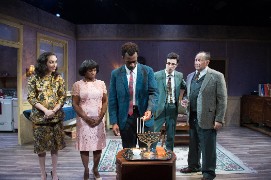 As powerful and moving a journey through time as any theatergoer could wish for, Eight Nights ties together events from the distant past with those as recent as this week’s headlines while reminding audiences that what happened then can happen again.
As powerful and moving a journey through time as any theatergoer could wish for, Eight Nights ties together events from the distant past with those as recent as this week’s headlines while reminding audiences that what happened then can happen again.
Emily Chase directs with attention to character, era, and nuance, staging decade-to-decade transitions with seamless finesse, most particularly when Tessa Auberjonois, previously seen as the ghost of Erich’s Holocaust victim wife Anna, assumes the role of Rebecca from the 1970s on.
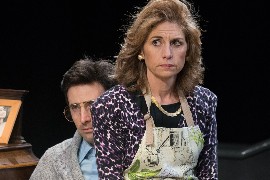 Together, Yale and Auberjonois create the indelible portrait of a woman who gradually morphs from fearful new arrival (the mere sound of a knock on the door has 19-year-old Rebecca cowering for safety) to successful businesswoman still racked by survivor’s guilt to loving, open-minded grandmother, a role that allows Auberjonois to dazzle and devastate and talented UCLA Class of 2017 grad Yale to create three distinct young women (Rebecca, her daughter Nina, and her granddaughter Amy) connected by blood and by love.
Together, Yale and Auberjonois create the indelible portrait of a woman who gradually morphs from fearful new arrival (the mere sound of a knock on the door has 19-year-old Rebecca cowering for safety) to successful businesswoman still racked by survivor’s guilt to loving, open-minded grandmother, a role that allows Auberjonois to dazzle and devastate and talented UCLA Class of 2017 grad Yale to create three distinct young women (Rebecca, her daughter Nina, and her granddaughter Amy) connected by blood and by love.
Gross does powerful work, first as a man racked with regret and later as a refugee for whom America offers hope he has no idea might soon be dashed, and Zuckerman’s Aaron is as charming a romantic leading man as he is a feisty New Yorker.
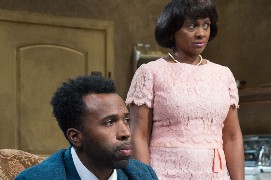 Watson and White are terrific too as a Civil Rights era couple who’ve left Texas behind for the sake of their three growing boys, the duo later returning in an additional role each.
Watson and White are terrific too as a Civil Rights era couple who’ve left Texas behind for the sake of their three growing boys, the duo later returning in an additional role each.
 Last but not least, Kawaoka could not make for a more winning Steve followed by a brief cameo as an Englishman named Inge.
Last but not least, Kawaoka could not make for a more winning Steve followed by a brief cameo as an Englishman named Inge.
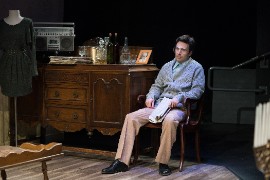 Scenic designer Edward E. Haynes, Jr. and properties designers Adam Meyer and Shen Heckel’s modest NYC apartment undergoes subtle alterations as decade follows decade, lighting designer Karyn D. Lawrence earns bonus kudos for her strikingly lit scene changes, Alex Jaeger’s era-establishing costumes are winners too, Jeff Gardner underscores all eight decades with a subtly minor-keyed musical soundtrack, and Adam R. Macias’s projections cue us in to each new December date.
Scenic designer Edward E. Haynes, Jr. and properties designers Adam Meyer and Shen Heckel’s modest NYC apartment undergoes subtle alterations as decade follows decade, lighting designer Karyn D. Lawrence earns bonus kudos for her strikingly lit scene changes, Alex Jaeger’s era-establishing costumes are winners too, Jeff Gardner underscores all eight decades with a subtly minor-keyed musical soundtrack, and Adam R. Macias’s projections cue us in to each new December date.
Lauren Lovett is dialect coach. Bo Foxworth is fight choreographer. Ryan McRee is dramaturg and Paula Cizmar is new play dramaturg. Phinneas Kiyomura is set to take over the roles of Steve/Inge during Kawaoka’s absence.
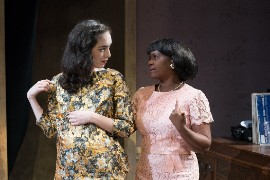 Heather Gonzalez is production stage manager and Connie Ayala is assistant stage manager. Meyer is production Manager and technical director, and Cuyler Perry is assistant technical director.
Heather Gonzalez is production stage manager and Connie Ayala is assistant stage manager. Meyer is production Manager and technical director, and Cuyler Perry is assistant technical director.
The concurrently running The Abuelas had me wondering whether Antaeus Theatre Company had erred in temporarily abandoning its classic play tradition for a couple of new works.
Not only does Eight Nights restore my faith in Antaeus, it’s a play that regional theaters across the country would be well advised to snap up asap. Like Jennifer Maisel’s The Last Seder (“You don’t have to be Jewish to fall in love with The Last Seder”) and #athespeedofjake (“Theater at its life-affirming best”), Eight Nights will make you laugh, make you cry, make you think, make you feel, make you stand up and cheer.
Kiki & David Gindler Performing Arts Center, 110 East Broadway, Glendale.
www.Antaeus.org
–Steven Stanley
November 8, 2019
Photos: Jenny Graham
Tags: Jennifer Maisel, Los Angeles Theater Review, The Antaeus Company



 Since 2007, Steven Stanley's StageSceneLA.com has spotlighted the best in Southern California theater via reviews, interviews, and its annual StageSceneLA Scenies.
Since 2007, Steven Stanley's StageSceneLA.com has spotlighted the best in Southern California theater via reviews, interviews, and its annual StageSceneLA Scenies.







 COPYRIGHT 2025 STEVEN STANLEY :: DESIGN BY
COPYRIGHT 2025 STEVEN STANLEY :: DESIGN BY